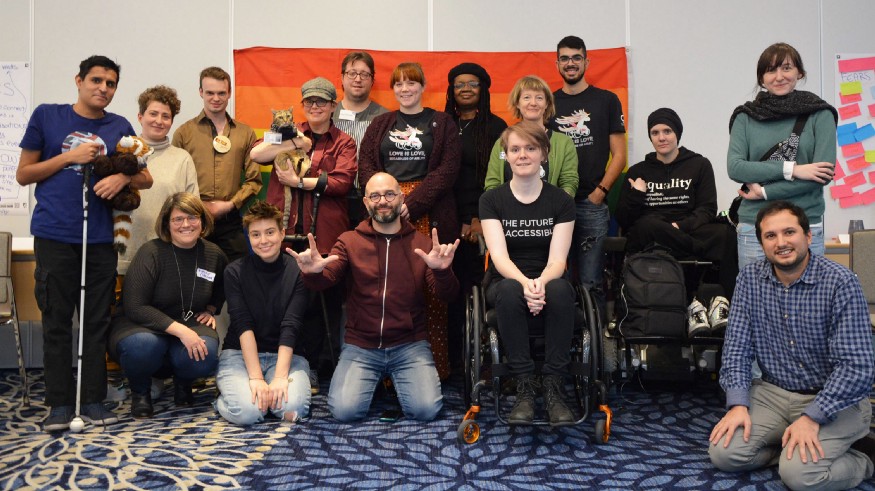#DisRainbow: What We Learned from the First ILGA-Europe Gathering of D/deaf and Disabled LGBTI Activists

Valeria Santostefano is ILGA-Europe’s Senior Programmes & Policy Officer who organised the gathering in November and shared her thoughts on this blog.
An exciting two-day event with 11 D/deaf and disabled LGBTI activists from nine European countries this month gave everyone involved some crucial take-aways and key priorities for future movement building.
On the 22 and 23 of November, ILGA-Europe hosted a gathering of 11 D/deaf and disabled LGBTI activists from nine countries throughout the European region. It was for us all an incredible opportunity to meet, share experiences, exchange information, and pull together knowledge, tools and practices to support and strengthen D/deaf and disabled LGBTI people, communities and movements.
To our knowledge, international initiatives around LGBTI disability are lacking in our region. D/deaf and disabled LGBTI people clearly face specific barriers and challenges when accessing human rights. As much as accessibility and inclusiveness have more and more been part of LGBTI groups and organisations’ conversations and practices, most D/deaf and disabled LGBTI people continue to be marginalised in LGBTI movements across Europe and Central Asia. At ILGA-Europe, we wanted to contribute to changing that.
Organising the gathering is part of ILGA-Europe’s broader and ongoing effort to ensure that our work – both within our organisation and the movement – is increasingly intersectional and accessible. We are also strongly committed to supporting the work of those within the LGBTI+ communities whose intersectional identities are met with even more marginalisation and exclusion from our societies. Both purposes are in line with what emerged from the event: there is a pressing need for ensuring that D/deaf and disabled LGBTI experiences are fully acknowledged, visible and represented in our work and they are in leading positions.
Alliances and Connections
Building alliances and working in solidarity is central to this work. Our strong relationship with the European Disability Forum (EDF) allowed tackling intersectionality between disability and LGBTI within both our movements. During the 2018 ILGA-Europe conference in Brussels, we ran a workshop together, which informed us on key conversations and needs within the LGBTI movement. Then, in 2019 we organised half-day peer exchange between our two staff teams. We shared materials and expertise, supported each other’s campaigns that were relevant to our communities, and developed a practice of mutual support. EDF’s support was precious in preparing for November’s gathering with D/deaf and disabled LGBTI activists. Building alliances and connecting was one of the suggestions from the gathering too.
Connecting with D/deaf and disabled LGBTI activism is key, so we needed to make sure that the gathering was relevant to those concerned. We engaged with a disability and LGBTI activist and asked them to work with us on this event from the start. Their engagement was an endless source of expertise and strategic thinking and allowed us to connect with more activists. The idea of this gathering resonated with them too. ‘Nothing about us without us’ was a crucial takeaway from the group who gathered in Brussels.
What the Priorities Are
The event was an opportunity to take stock of the experiences faced by D/deaf and disabled LGBTI people in various countries in Europe, as shared by the participants on the basis of their work. Participants discussed different forms of organising and activism, what the status of such organising is in their own situations, their cooperation with LGBTI/disability rights groups, the strategies and tools used, and existing gaps, etc. The gathering provided a space to reflect together on the needs for movement building at the regional level.
Priorities identified during the gathering are around: connecting voices and ideas, visibility of D/deaf and disabled LGBTI people, educating LGBTI and disability organisations, and campaign and advocacy for legal and policy changes. From the perspective of the LGBTI movement some key priorities of work came up too. We need to rethink some of our practices in order to make sure that our work is accessible and that participation is possible. Productivity and heavy workloads are part of this conversation, but also accessibility of our events, and first of all accessibility of LGBTI pride events.
Visibility of D/deaf and disabled LGBTI people is a key need. A lack of funding is clearly part of the problem and there are not enough resources to support intersectional work. More awareness of disability rights within the LGBTI movement is needed and acknowledgment that disability rights are human rights has still fully to come.
Organising the event, we learned a lot about how we could and should make our work more accessible. It challenged our own view of accessibility in our work and it brought up pressing issues. We are committed to keep on doing the work, but we also know that a lot needs to happen in countries, at the local level, within LGBTI groups and organisations.
Stay tuned for part two of our blog on ILGA-Europe’s D/deaf and disabled LGBTI gathering, where we’ll share some of the practical steps and learnings from the event that can be of inspiration to other groups, organisations and individuals who wants to step up their work around disability and LGBTI.
Want to know more? Check out Valeria’s other post 7 Practical Takeaways from the First ILGA-Europe Gathering of D/deaf and Disabled LGBTI Activists